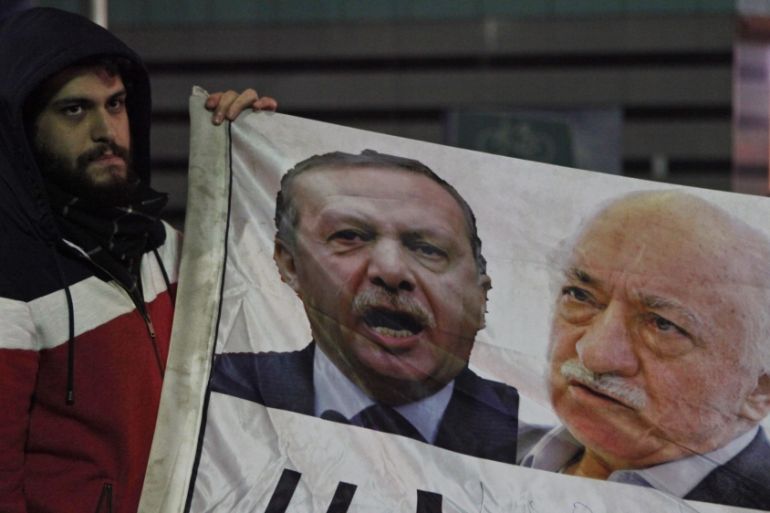Turkey court issues arrest warrant for Fethullah Gulen
Pennsylvania-based religious leader rejects allegation by Istanbul-based court he ordered failed July 15 coup attempt.

A court in Turkey has issued a formal warrant for the arrest of Fethullah Gulen, the US-based Turkish Muslim religious leader whom the government accuses of being behind the failed July 15 coup attempt that left more than 270 people dead.
The state-run Anadolu news agency said on Thursday that an Istanbul-based court issued the warrant for Gulen for “ordering the July 15 coup attempt”.
Keep reading
list of 4 itemsWhat was Turkey’s failed coup about – and what’s happened since?
Terrorism has no nationality, ethnicity or religion
‘Still not over’: Emotions high 5 years after failed Turkey coup
The government says Gulen, a former ally of President Recep Tayyip Erdogan who now lives in self-imposed exile in the US state of Pennsylvania, masterminded the coup attempt by renegade officers in the Turkish military. Ankara wants him extradited to Turkey.
“This arrest warrant for Fethullah Gulen is more of a symbolic legal move,” Al Jazeera’s Bernard Smith, reporting from Istanbul, said.
“It is not going to have a practical effect because Gulen is not here in Turkey.”
READ MORE: Erdogan – The West is siding with coup plotters
For his part, Gulen, who has denied the government’s accusations, denounced the arrest warrant.
“It is well-documented that the Turkish court system is without judicial independence, so this warrant is yet another example of President Erdogan’s drive for authoritarianism and away from democracy,” he said in a statement on Thursday.
Turkey has not yet made a formal extradition request, but the arrest warrant could be a prelude to that process.
The US has asked for evidence of Gulen’s involvement, and has said the extradition process must be allowed to take its course.
Previous warrants
This is the first warrant issued to arrest Gulen in the aftermath of the failed coup attempt. But it is not the first arrest warrant for him in Turkey.
In the past, he has been accused of being the leader of an organisation that illegally tapped into the conversations of Erdogan and Ahmet Davutoglu, the former prime minister.
Turkey has designated Gulen’s network, which runs charities, schools and businesses across the world, as a “terrorist organisation” and has launched a widespread crackdown on suspected members since the failed coup attempt.
Around 26,000 people have been detained or arrested, mostly from the military, on suspicion of being involved in the failed putsch, and an estimated 70,000 people have been suspended or dismissed from jobs in the civil service, judiciary, education, healthcare, the military, and the media.
|
|
Earlier on Thursday, Erdogan pledged to go after businesses linked to Gulen’s network.
“Without doubt, this organisation has an extension in the business world. Maybe it is what they are most powerful at,” Erdogan said during a speech to the heads of chambers of commerce in Ankara.
“We are determined to totally cut off all business links of this organisation, which has blood on its hands.”
Erdogan said that every cent that goes to the Gulen movement “is a bullet placed in a barrel to be fired against this nation. In the same way that we do not pardon those who fire the bullet, we will not forgive those who financed the bullet”.
‘Tip of the iceberg’
Erdogan promised that the purge of the military would continue.
“After July 15, this sneaky organisation’s structure in the Turkish Armed Forces has started to be uncovered,” he said.
“For now, those who are captured are the tip of the iceberg. Efforts are continuing for others.”
OPINION: In Turkey, democratic transition defeats esotericism
Meanwhile, Mehdi Eker, deputy chairman of Turkey’s ruling Justice and Development Party, said countries around the world need to take action against schools or other establishments linked to Gulen.
Eker said the group had hundreds of schools, charities or other establishments in more than 100 countries and warned that they too could face “security risks” from the group in the future.
“It is our responsibility to warn countries that have [Gulen-linked] schools,” Eker said.
“In Africa, we know that they work as nurseries [for terror] and we want to warn them.”
In a separate development, former Istanbul Governor Huseyin Avni Mutlu was remanded in custody early on Friday in connection with the failed coup attempt.
Mutlu and 11 other suspects, including seven governors, a deputy governor and three district governors, have been remanded for being members of the Gulen network, according to Turkey’s state-run Anadolu agency.